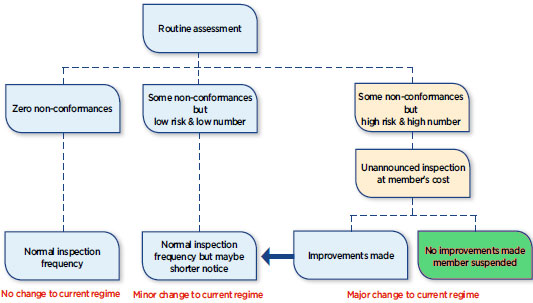



Red Tractor to Roll Out New Inspection Regime to Dairy Sector
UK - Poor performing farms are to receive unannounced inspections in a move to increase consumer confidence in Red Tractor logo.From April 2019, Red Tractor dairy farms will move to a new risk-based inspection regime.
The decision to strengthen the inspection programme is part of a strategy to increase consumer confidence that food carrying the logo is safe, traceable and farmed with care.
This follows the rollout of the new regime to the pig sector last year.
Depending on the nature and number of non-conformances during a routine inspection, poor performers will receive an increase in inspection frequency, which will be unannounced.
If improvements aren’t made, those poor performers will be suspended or withdrawn from the scheme to protect the reputation of British farming and the Red Tractor logo.
The vast majority of members do a fantastic job adhering to every standard every day, and those who continue to achieve these high standards and can demonstrate it at their normal inspection will notice no changes to their inspection programme.

How inspections are changing
Red Tractor’s current system of measuring compliance is based on routine inspections regardless of whether a member has a 100 percent compliance record or multiple non-conformances at every inspection.
From April, a new risk-based approach will be adopted.
A considerable amount of time has been spent developing a fair and objective method of identifying high-risk members.
This is an internal system which uses the nature and number of non-conformances to categorise each member according to reputational risk.
All standards have been weighted according to reputational risk, for example the standard requiring livestock to be handled in a way that avoids injury and minimises stress has been given greater weighting than having a farm map.
However, all standards are important and must be complied with at all times.
For most members, there will be no noticeable change; a routine inspection will take place and reported back to Red Tractor by the certification body.
If after the result of an inspection a member is classified by Red Tractor as higher risk, an additional unannounced inspection will be triggered at the farmer’s cost and they will be notified by their certification body.
Unannounced inspections
The inspection will take the form of a spot check and no notice will be given to the farm.
To avoid logistical and practical issues, members who require an unannounced visit will be asked to provide information to reduce the chance of no-one being available to carry out the inspection.
This will include contact telephone numbers, routine and biosecurity requirements.
The assessor will wait for a minimum time period but if no-one is available and the assessor hasn’t been able to speak to anyone after calling the contact numbers, a failed inspection card will be left.
The member will have to pay for a rescheduled unannounced inspection.
If improvement can be demonstrated, members are no longer categorised as higher risk and will be informed by their certification body.
They will then continue with the normal inspection frequency, albeit possibly at shorter notice.
If no improvement has been made, membership will be suspended. When a member is suspended, no products from the farm can be marketed as assured.
A member who has been suspended and has been re-instated back into the scheme after successfully correcting all non-conformances will be subject to a further unannounced inspection at their cost.
If there is no improvement after this inspection, membership will be withdrawn.
Upholding the reputation of Red Tractor
Red Tractor is working towards 100 percent compliance from every member on every standard every day.
It is vital that consumers have complete trust in the assurance scheme if they are to continue to buy food and drink bearing the logo.
Member rules on the new risk-based approach to inspections can be found here.
TheCattleSite News Desk


